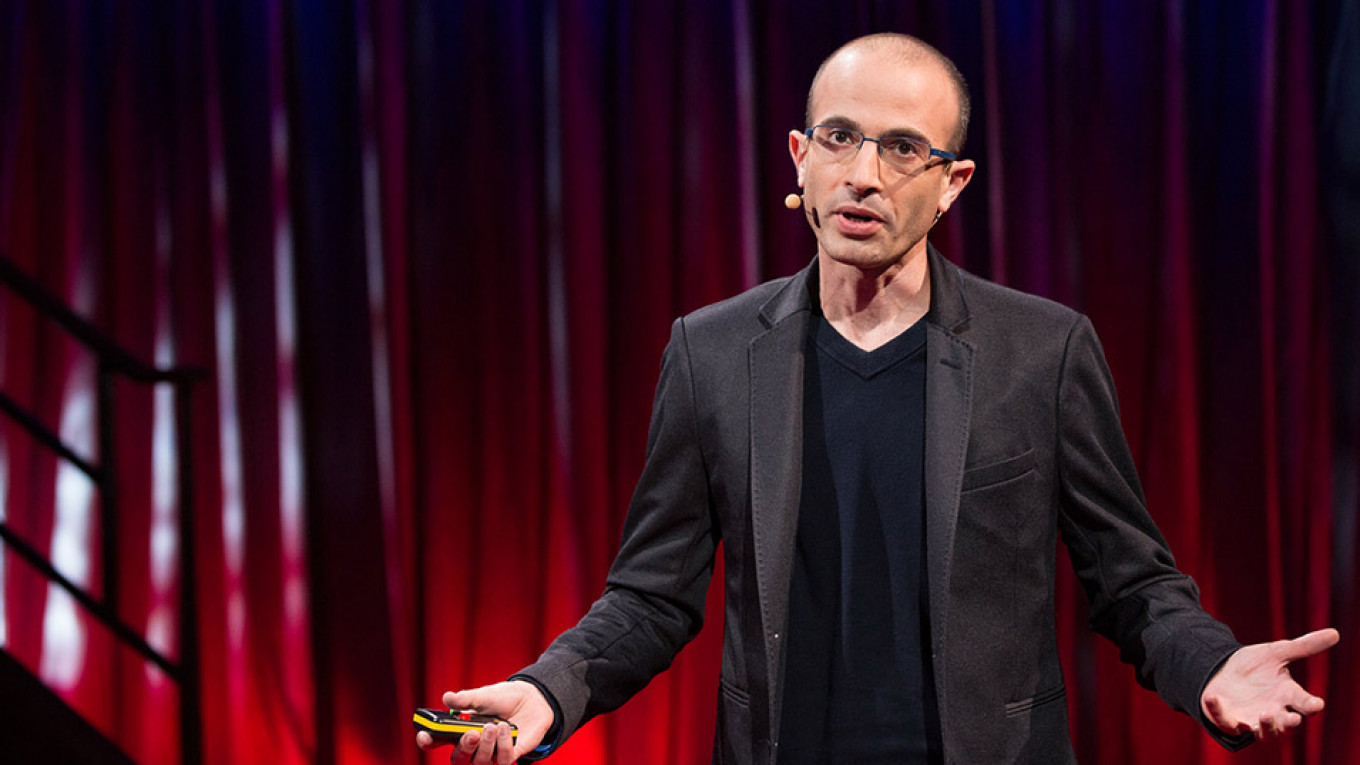To reach China’s enormous audiences, writers and filmmakers must submit to official censorship. But in Russia, where censorship is constitutionally banned, Western creators and companies will sometimes allow their content to be excised in order to avoid displeasing the authorities.
The latest incident involves Israeli historian Yuval Noah Harari, whose book “Sapiens. A Brief History of Humankind” sold 1.8 million copies in 45 languages. His third bestseller, “21 Lessons for the 21st Century,” came out in Russian in June. Eagle-eyed readers soon spotted a difference between the Russian translation and the text published in other languages.
The non-Russian versions of a chapter about humans being a “post-truth species” addresses the difference between the Russian and Ukrainian narrative of the Crimea invasion. Russian President Vladimir Putin claimed Russian troops weren’t involved. He, Harari wrote, described the fighters as “spontaneous ‘self-defense groups’ that may have acquired Russian-looking equipment from local shops. As they voiced this rather preposterous claim, Putin and his aides knew perfectly well that they were lying.”
In the Russian version, however, the lengthy passage on Russia and Ukraine was replaced with what appears to be a partial translation of a Harari column on the Israeli website Ynet (skirting the bits where the writer calls Russia “tyrannical” and undemocratic). Mentions of Putin are gone, and instead there’s a passage on Donald Trump making thousands of false statements.
It was soon revealed that Harari authorized the change, which was suggested by the Russian publishing house, Sindbad. “My goal is for the main ideas of the book, concerning the dangers of dictatorship, extremism and fanaticism, to reach the broadest possible audience, including in countries with non-democratic regimes,” he said in a statement. “Some examples in this book can repel this audience or lead to censorship on the part of a certain regime. For that reason I sometimes allow adaptation and authorize changing certain examples, but never the main ideas of the work.”
It’s rather post-truth to teach the residents of dictatorships about post-truth only using examples from other countries. But then, Harari is not alone in allowing a Russian partner to exercise caution.
In another recent high-profile example, Central Partnership, a Russian movie distributor, cut scenes with gay sex, male kissing and drug use from “Rocketman,” the Paramount Pictures Corp biopic of Sir Elton John. The musician and the filmmakers were outraged. “That the local distributor has found it necessary to edit out certain scenes, denying the audience the opportunity to see the film as it was intended is a sad reflection of the divided world we still live in,” read their post on the musician’s Twitter account.
Paramount, however, issued its own statement showing that it agreed to the cuts: “We are releasing the film in its entirety around the world regardless of rating, but like all studios, we must adhere to local laws and requirements in certain territories in which the film is being shown.”
In both cases, the self-censorship was unnecessary. No one would have banned the Harari book or impeded its sales: The Russian book market has enjoyed an extraordinary freedom from government interference. A number of books, such as Hitler’s “Mein Kampf,” are banned under Russia’s “extremism" laws, and certain books with vivid descriptions of drug-taking sometimes have been removed from stores by police. But as far as I know no book has ever been banned or pulled from stores for criticizing Putin or the Crimea invasion.
Russia does have a law against exposing minors to “gay propaganda,” but it doesn’t require the removal of gay scenes from movies not meant for children. In fact, even in children’s movies homosexuality isn’t strictly taboo. In 2017, Malaysian censors demanded that a mild gay scene be cut from Disney’s remake of “Beauty and the Beast” (the company refused), but the Russian Culture Ministry, responsible for issuing screening permits, made no objection to it. In the “Rocketman” case, Culture Minister Vladimir Medinsky denied that Central Partnership was ever asked to excise anything from the movie.
Putin’s Russia, obviously, can be a tough environment for creators. The extremism and antidrug laws are arbitrarily applied, and publishers and other content businesses can come under various forms of extra-legal pressure, including harassment by pro-Kremlin “civil society organizations.” But some Russian organizations still choose to live with the risk. For Western creators, dealing with Russian partners who prefer to err on the side of caution is not the only choice. When the relationship is deep and long-standing, as between Paramount and Central Partnership, the Western company can still insist on preserving a work’s integrity.
Submitting to illiberal laws in markets with authoritarian regimes is a questionable practice — after all, there are plenty of other lucrative markets — but at least it’s understandable. Where the legal restrictions don’t really exist, however, caution — or, to call it by its proper name, cowardice — is harder to defend. The least content creators from freer countries can do is take a principled stand against craven self-censorship. The reputational damage from bowing to it can exceed the potential Russian revenues.
This article was originally published by Bloomberg
A Message from The Moscow Times:
Dear readers,
We are facing unprecedented challenges. Russia's Prosecutor General's Office has designated The Moscow Times as an "undesirable" organization, criminalizing our work and putting our staff at risk of prosecution. This follows our earlier unjust labeling as a "foreign agent."
These actions are direct attempts to silence independent journalism in Russia. The authorities claim our work "discredits the decisions of the Russian leadership." We see things differently: we strive to provide accurate, unbiased reporting on Russia.
We, the journalists of The Moscow Times, refuse to be silenced. But to continue our work, we need your help.
Your support, no matter how small, makes a world of difference. If you can, please support us monthly starting from just $2. It's quick to set up, and every contribution makes a significant impact.
By supporting The Moscow Times, you're defending open, independent journalism in the face of repression. Thank you for standing with us.
Remind me later.








